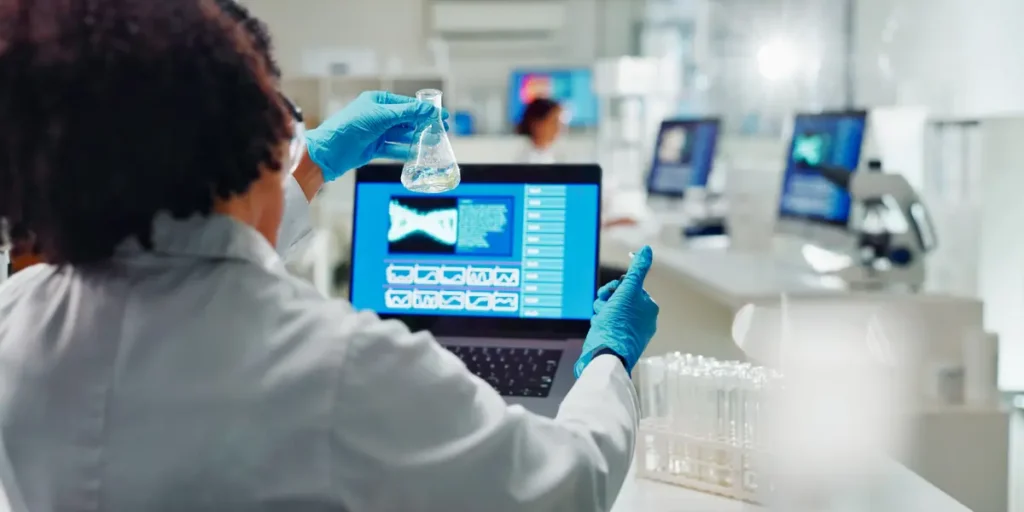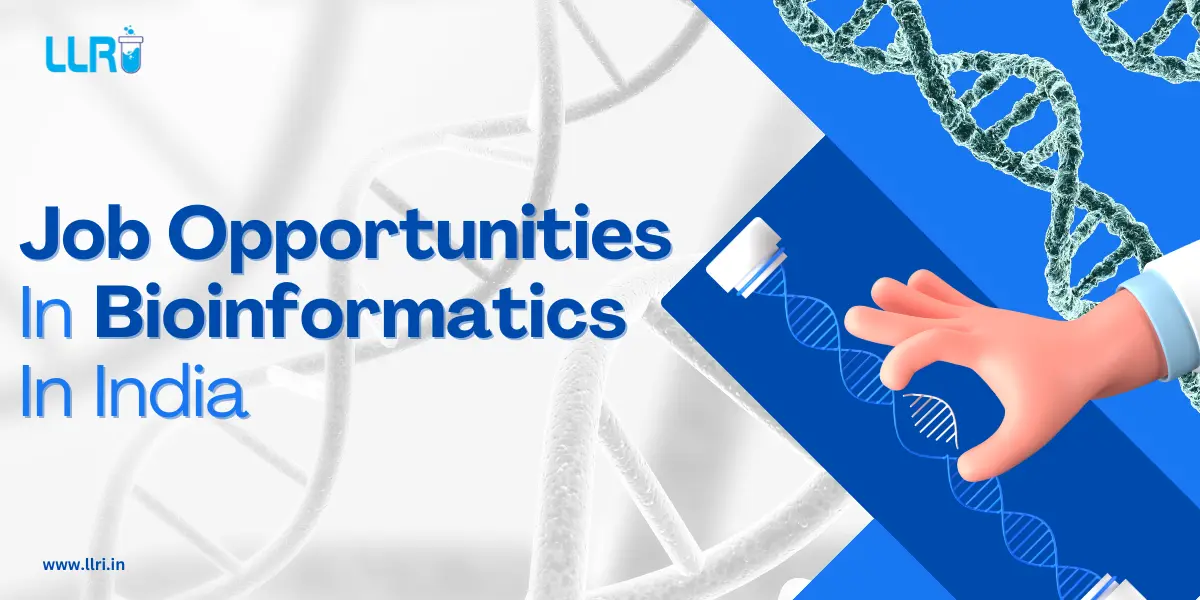Job Opportunities In Bioinformatics: Bioinformatics is at the crossroads of biology, computer science, and mathematics – a mix of the three – making it an exciting and evolving career path. With the increasing demand for bioinformatics professionals in industries like pharmaceuticals, healthcare, and agriculture, India is emerging as a hub for bioinformatics research and development.
This blog will cover:
- What is Bioinformatics?
- Job Opportunities In Bioinformatics
- Bioinformatics Scope and Salary in India
- Bioinformatics Roles and Responsibilities
- How to Get a Job in Bioinformatics?
- Best Institutes & Courses for Bioinformatics Training
What is Bioinformatics?
Bioinformatics is the application of computational techniques to analyze biological data. It combines:
- Biology – Understanding genetics, molecular biology, and biological processes.
- Computer Science – Programming, software development, and data analysis.
- Mathematics & Statistics – Statistical modeling, algorithms, and data interpretation.
Also, bioinformatics is the use of computational tools to analyze large biological datasets, such as DNA sequences, protein structures, and genomic data. It plays a vital role in research areas like:
- Genomics – Studying genes and their functions.
- Proteomics – Analyzing protein structures and functions.
- Drug Discovery – Designing new drugs using computational biology.
- Personalized Medicine – Developing treatments based on genetic profiles.
Why is Bioinformatics Important?
With advancements in genomics and biotechnology, researchers are generating massive biological datasets. Bioinformatics helps scientists make sense of this data, leading to breakthroughs in medicine, agriculture, and environmental science.
The Human Genome Project (HGP), which mapped all human genes, was possible due to bioinformatics.

Job Opportunities In Bioinformatics
Here are some key job opportunities in bioinformatics:
1. Bioinformatics Analyst
- Role: Bioinformatics analysts are responsible for processing, analyzing, and interpreting biological data, such as genomic sequences and protein structures. They often work in research labs, pharmaceuticals, or healthcare settings.
- Skills Needed: Proficiency in bioinformatics tools (e.g., BLAST, ClustalW), programming languages (Python, R, Perl), and statistical analysis.
2. Computational Biologist
- Role: Computational biologists develop algorithms and models to understand complex biological systems. Their work often involves analyzing genetic sequences, protein structures, and ecological data to draw conclusions about biological processes.
- Skills Needed: Strong programming skills (Python, R, Java), knowledge of computational biology algorithms, and experience with large-scale biological datasets.
3. Genomics Data Scientist
- Role: Genomics data scientists focus on analyzing genomic data to understand the genetic basis of diseases, traits, and other biological phenomena. They may work in research, diagnostics, or personalized medicine.
- Skills Needed: Expertise in genomics tools, data analysis techniques, and statistical programming (R, Python).
4. Bioinformatics Software Developer
- Role: Software developers in bioinformatics build custom tools and platforms to process and visualize biological data. They may work with lab teams to design software for genomics, proteomics, and other biological data applications.
- Skills Needed: Proficiency in programming (C++, Java, Python), software development, and knowledge of bioinformatics workflows.
5. Clinical Bioinformatics Specialist
- Role: Clinical bioinformaticians work in healthcare settings, providing insights into patient data, including genomic sequences, to assist in diagnosis and treatment planning, especially in precision medicine.
- Skills Needed: Understanding of clinical data, genomic analysis, and regulatory guidelines for clinical applications.
Continue reading to know the best Job Opportunities In Bioinformatics.
6. Pharmacogenomics Specialist
- Role: These professionals apply bioinformatics methods to study how genetic variation affects drug responses. They often work in pharmaceutical companies or research institutes to support drug development.
- Skills Needed: Knowledge of genetics, pharmacology, bioinformatics tools, and programming.
7. Research Scientist in Bioinformatics
- Role: Research scientists conduct experiments and develop new methodologies in bioinformatics. They often work in academic or corporate research environments, contributing to advancements in areas like genomics, systems biology, and synthetic biology.
- Skills Needed: Expertise in molecular biology, bioinformatics, and data analysis, along with research skills.
8. Data Engineer in Bioinformatics
- Role: Data engineers in bioinformatics are responsible for managing, cleaning, and processing large biological datasets, ensuring that data is structured for analysis by bioinformaticians and other researchers.
- Skills Needed: Experience in database management, programming, and big data technologies (e.g., Hadoop, Spark).
9. Bioinformatics Consultant
- Role: Consultants provide expert advice to companies or research organizations on bioinformatics strategies, tool selection, and data analysis pipelines. They may also assist in regulatory compliance and data interpretation.
- Skills Needed: In-depth knowledge of bioinformatics, strong communication skills, and experience in various research applications.
10. AI and Machine Learning Specialist in Bioinformatics
- Role: These professionals focus on applying machine learning algorithms to bioinformatics problems, such as identifying patterns in genetic data or predicting protein structures.
- Skills Needed: Expertise in AI and machine learning, knowledge of bioinformatics, and proficiency in Python or R.
11. Bioinformatics Project Manager
- Role: Project managers coordinate bioinformatics research or development projects, ensuring timelines, budgets, and resources are appropriately managed. They often work in pharma, biotech, or academic research institutions.
- Skills Needed: Strong organizational and leadership skills, experience in project management, and understanding of bioinformatics processes.
12. Systems Biologist
- Role: Systems biologists integrate data from various biological sources, such as genomics, proteomics, and metabolomics, to understand the underlying systems that govern biological processes.
- Skills Needed: Knowledge of systems biology, data integration, computational modeling, and programming.

Bioinformatics Scope And Salary In India
Most positions in bioinformatics require at least a bachelor’s degree in bioinformatics, biology, computer science, or related fields, with many roles requiring a master’s or Ph.D. for higher-level research and development opportunities.
Industries hiring bioinformatics professionals
- Pharmaceutical Companies – Drug discovery and development.
- Healthcare & Genomics – Personalized medicine and genetic research.
- Biotechnology Firms – Molecular modeling and genetic engineering.
- Agriculture & Environmental Science – Sustainable farming and crop improvement.
- Research Institutes & Academia – Scientific research and teaching.
- Medical Device Companies
- Government and Regulatory Bodies
According to industry estimates, a bioinformatics professional in India earns an average of ₹43,000 per month. However, salaries vary based on experience, skills, and the organization.
| Experience Level | Average Annual Salary (INR) |
| Entry-Level (0-2 years) | ₹4-6 LPA |
| Mid-Level (3-6 years) | ₹7-12 LPA |
| Senior-Level (7+ years) | ₹15-25 LPA |
The Bureau of Labor Statistics (BLS) projects that bioinformatics-related industries, including biochemistry and computational biology, will experience significant growth over the next decade.
While there is a wide range of bioinformatics job opportunities available (as aforementioned), we have compiled a list of positions along with their respective salaries, sourced from Ambitionbox.com.
1. Bioinformatics Scientist
Job Description: Bioinformatics scientists leverage technology to study and analyze biological datasets to address challenges in biosciences. They are also involved in developing software, communicating findings, collaborating with teams, and maintaining research records.
Average Salary: INR 9.6 LPA
2. Bioinformatics Analyst
Job Description: Bioinformatics analysts specialize in interpreting biological data using statistical and computational methods. Their work includes identifying patterns, researching disease pathologies, and developing algorithms and experimental setups.
Average Salary: INR 5.3 LPA
3. Bioinformatics Specialist
Job Description: Bioinformatics specialists assist scientists in managing, processing, and analyzing biological data like DNA and biochemical data. They are responsible for building and maintaining databases, utilizing statistical software, and ensuring data quality.
Average Salary: INR 7.8 LPA
4. Bioinformatics Research Assistant
Job Description: Research assistants in bioinformatics help implement existing algorithms and use computer software to analyze omics-based data in various research studies.
Average Salary: INR 4 LPA
5. Biostatistician
Job Description: Biostatisticians apply statistical and mathematical principles to gather, analyze, and synthesize data, which helps make inferences in fields like agriculture and medicine.
Average Salary: INR 5.7 LPA
6. Microbiologist
Job Description: Microbiologists design and execute research projects, such as developing medications for infectious diseases or improving sterilization processes.
Average Salary: INR 3 LPA
7. Molecular Biologist
Job Description: Molecular biologists study molecular and biochemical processes in plant and animal life. They may work in various fields like clinical research, gene sequencing, pharmaceuticals, biotechnology, plant science, or medical treatment.
Average Salary: INR 3.4 LPA
Continue reading to know the best Job Opportunities In Bioinformatics – and its roles and responsibilities.

Bioinformatics Roles And Responsibilities
1. Bioinformatics Scientist
Responsibilities:
- Develop computational tools to analyze biological data.
- Collaborate with researchers to solve biological challenges.
- Create software applications for genome and protein analysis.
- Maintain and document research findings.
Responsibilities:
2. Bioinformatics Analyst
- Interpret biological data using computational methods.
- Identify patterns in genetic and proteomic datasets.
- Research disease mechanisms and genetic disorders.
- Develop algorithms for analyzing biological sequences.
3. Bioinformatics Specialist
Responsibilities:
- Manage and process biological data, including DNA sequencing results.
- Build and maintain bioinformatics databases.
- Use statistical software to analyze experimental data.
- Ensure data integrity and quality in research studies.
4. Bioinformatics Research Assistant
Responsibilities:
- Support senior scientists in research projects.
- Implement bioinformatics tools and existing algorithms.
- Analyze omics-based datasets (genomics, proteomics, metabolomics).
- Prepare reports based on research findings.
5. Biostatistician
Responsibilities:
- Apply statistical models to biological and medical data.
- Design and analyze clinical trials and epidemiological studies.
- Interpret research data for agricultural, medical, and environmental applications.
6. Microbiologist
Responsibilities:
- Conduct research on microorganisms and their applications.
- Develop new treatments for infectious diseases.
- Improve sterilization techniques for healthcare and biotech industries.
7. Molecular Biologist
Responsibilities:
- Study genetic and biochemical processes at the molecular level.
- Conduct experiments related to gene sequencing and expression.
- Work in clinical research, plant science, or pharmaceutical R&D.
8. Computational Biologist
Responsibilities:
- Develop algorithms to study complex biological processes.
- Analyze genetic sequences and protein structures.
- Model ecological and evolutionary data for research.
9. Genomics Data Scientist
Responsibilities:
- Analyze genomic data to study genetic variations.
- Research disease pathology and hereditary conditions.
- Work in precision medicine and personalized healthcare.
10. Bioinformatics Software Developer
Responsibilities:
- Design and develop software tools for biological data analysis.
- Create applications for genomics and proteomics research.
- Work closely with lab teams to automate data processing.
11. Clinical Bioinformatics Specialist
Responsibilities:
- Interpret patient genetic data for diagnosis and treatment.
- Collaborate with healthcare professionals in precision medicine.
- Develop bioinformatics solutions for clinical applications.
12. Pharmacogenomics Specialist
Responsibilities:
- Study how genetic variations affect drug responses.
- Assist pharmaceutical companies in drug development.
- Research genetic factors influencing medication effectiveness.
13. Data Engineer in Bioinformatics
Responsibilities:
- Structure and manage large-scale biological datasets.
- Optimize data pipelines for analysis by bioinformaticians.
- Ensure efficient storage and retrieval of genomic data.
14. Bioinformatics Consultant
Responsibilities:
- Advise biotech and pharmaceutical firms on bioinformatics strategies.
- Assist in selecting tools and developing data analysis pipelines.
- Provide regulatory compliance guidance for research data.
15. AI and Machine Learning Specialist in Bioinformatics
Responsibilities:
- Develop machine learning models for genetic and protein analysis.
- Identify patterns in large-scale genomic datasets.
- Enhance predictive analytics for precision medicine.
16. Bioinformatics Project Manager
Responsibilities:
- Oversee bioinformatics research and development projects.
- Manage project timelines, budgets, and team coordination.
- Work in academia, biotech firms, or pharmaceutical companies.
17. Systems Biologist
Responsibilities:
- Integrate data from genomics, proteomics, and metabolomics studies.
- Model biological systems to understand disease mechanisms.
- Conduct interdisciplinary research across biology and computational sciences.

How to Get a Job in Bioinformatics?
Wondering how to get a job in bioinformatics? Follow these steps:
1. Get the right education
A degree in bioinformatics, biotechnology, genetics, or computer science is essential.
Best Courses for Bioinformatics:
- BSc/MSc in Bioinformatics
- BTech/MTech in Biotechnology
- Advance Diploma in Bioinformatics
- Diploma in Bioinformatics
2. Learn key skills
- Programming: Python, R, Perl
- Data Analysis: Machine Learning, Big Data
- Genomics: DNA sequencing, CRISPR
- Databases: BLAST, NCBI, Ensembl
3. Gain hands-on experience
- Internships at research institutes & biotech companies.
- Participate in online bioinformatics projects.
4. Apply for jobs & network
- Search for openings on LinkedIn, Naukri, and Biotech job portals.
- Attend bioinformatics workshops and conferences.
Best Institutes for Bioinformatics & Clinical Research Training
If you’re looking for the best institute for PG Diploma in Clinical Research or Bioinformatics, consider Learning Labb Research Institute. They offer:
- Bioinformatics courses
- Clinical research courses
- Affordable clinical research course fees
- Practical clinical research training
India is rapidly becoming a leader in bioinformatics education, with universities offering specialized courses to meet industry demands.
On A Final Note…
Bioinformatics is an exciting and rewarding field with vast job opportunities in India. Whether you’re interested in research, healthcare, or data science, a career in bioinformatics offers competitive salaries and strong job security.
Check out Learning Labb Research Institute for the best bioinformatics programs – Advance Diploma in Bioinformatics and Certification in Bioinformatics.

